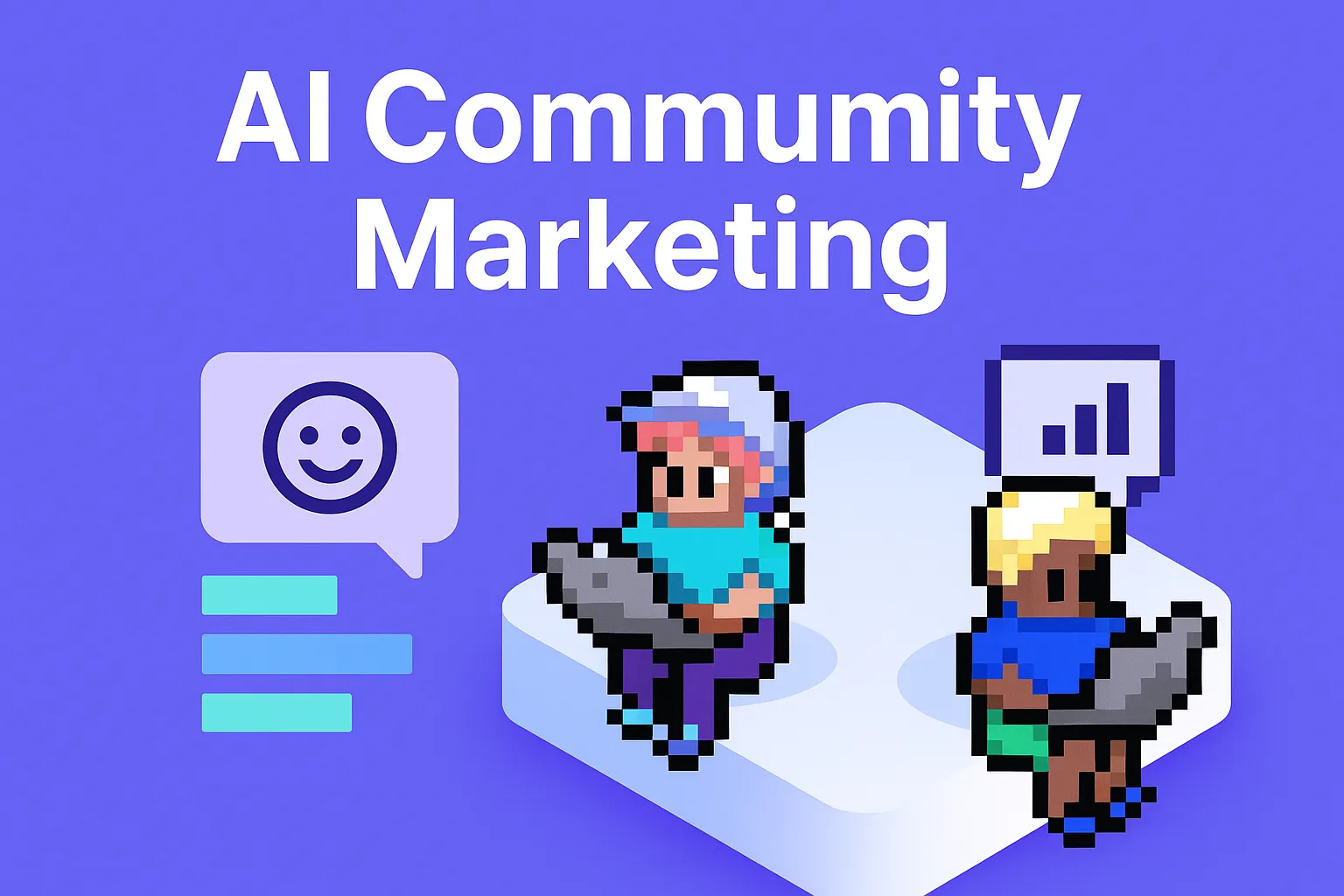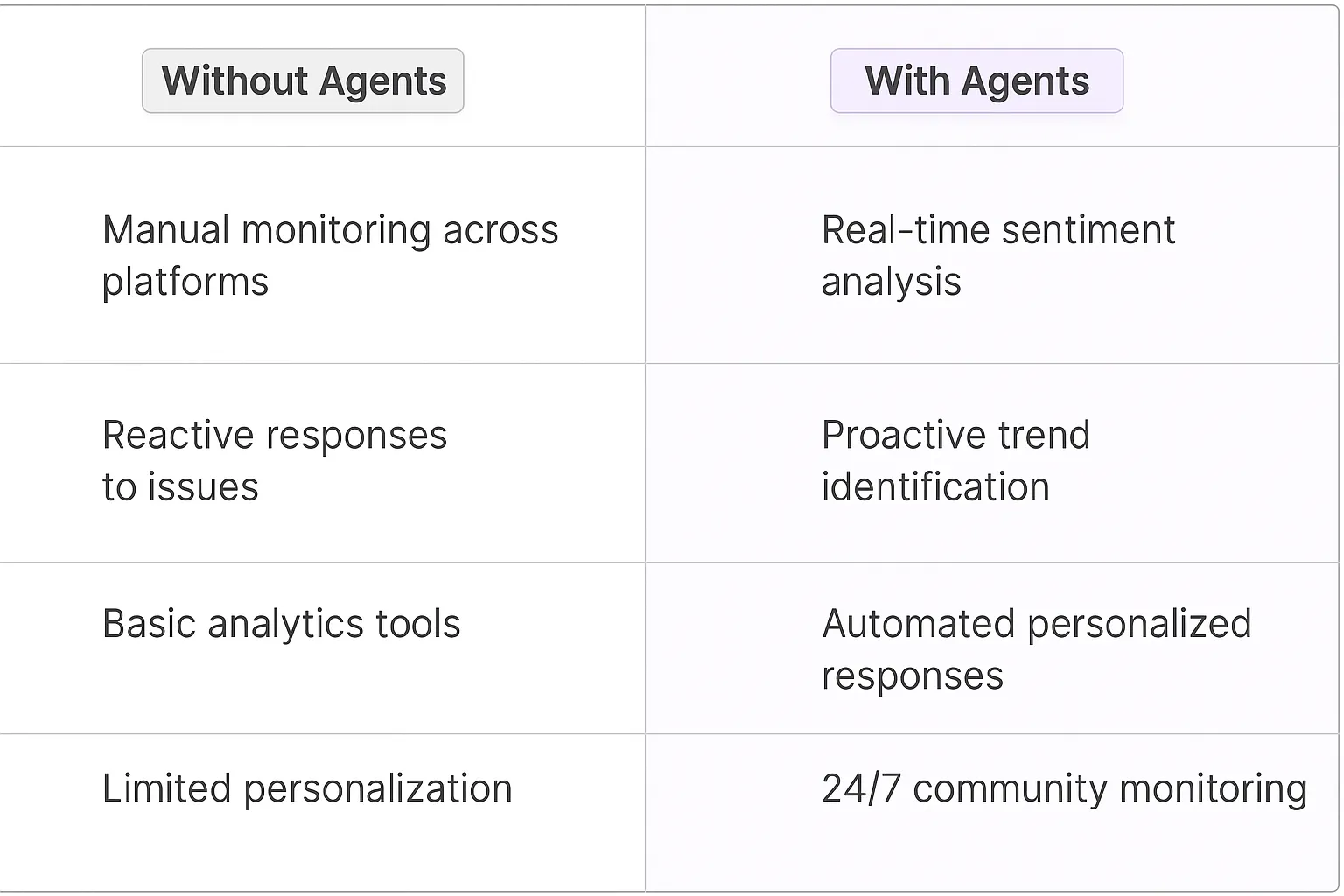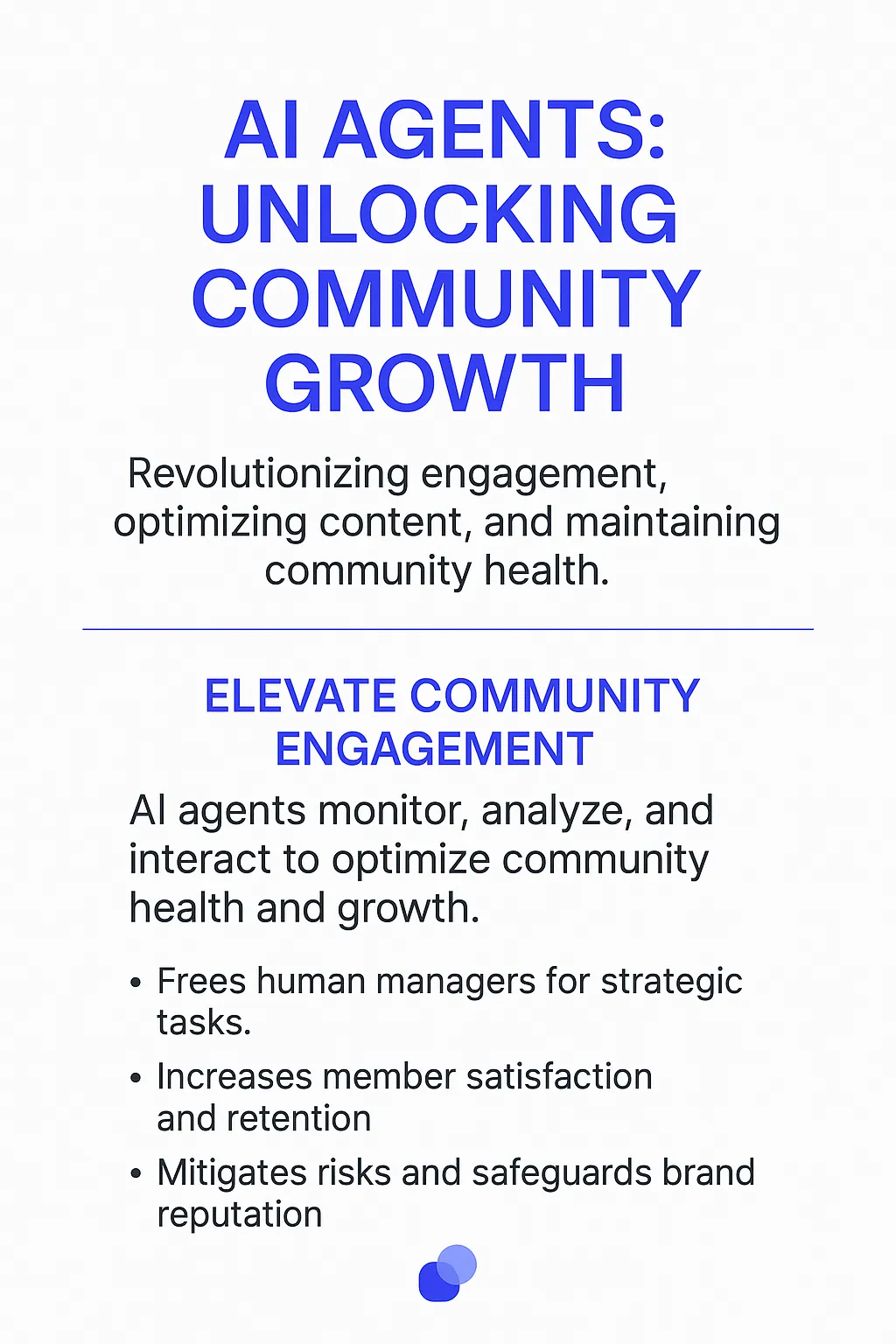Community Marketing Manager represents a sophisticated blend of AI technology designed specifically for managing and scaling online communities. It functions as a digital teammate that works alongside human community managers, handling everything from member engagement to trend analysis. The system processes vast amounts of community data to deliver personalized interactions while maintaining the authentic feel that communities thrive on.

Community marketing managers traditionally juggled multiple tools and manual processes to keep their communities engaged. They'd spend hours crafting individual responses, maintaining spreadsheets to track member engagement, and manually analyzing sentiment across various platforms. The typical stack included social media management tools, basic analytics platforms, and often a mix of Google Docs and Sheets for content planning.
The network effects of AI Agents in community management create exponential value through three core mechanisms:
1. Personalization at Scale
Digital teammates can analyze conversation patterns and member behaviors across thousands of interactions, delivering tailored responses that feel authentic and personal. This creates a flywheel effect where better engagement leads to more data, which further improves personalization.
2. Pattern Recognition
AI Agents excel at identifying emerging trends and sentiment shifts within communities before they become obvious. They can spot potential issues or opportunities by analyzing subtle changes in conversation topics, engagement levels, and member behaviors - something that would take humans weeks to notice.
3. Content Optimization
The most interesting aspect is how AI Agents learn from community interactions to generate increasingly relevant content. They understand which topics resonate, optimal posting times, and content formats that drive the most engagement. This creates a feedback loop where each piece of content becomes more effective than the last.
4. Proactive Community Health
Instead of reactive moderation, AI Agents can predict and prevent community issues by identifying early warning signs in conversations. They spot potential conflicts, toxic behavior patterns, or member dissatisfaction before they escalate into larger problems.
The key insight here is that AI Agents aren't just automating tasks - they're fundamentally changing how communities scale. They enable community managers to focus on strategy and relationship-building while maintaining the personal touch that makes communities thrive.

Community marketing is entering a new phase where digital teammates can amplify human connection rather than replace it. The most successful community managers I've observed are using AI agents to handle the repetitive tasks while focusing their energy on high-touch relationship building.
What's particularly fascinating is how AI agents are creating new feedback loops in community engagement. When an agent identifies trending topics or sentiment shifts, community managers can quickly pivot their strategy, creating a more responsive and dynamic community environment.
The network effects in community building become even more powerful when AI agents can process and act on community data in real-time. This creates what I call a "community intelligence flywheel" - where each interaction makes the community smarter and more valuable for its members.
The key insight here isn't just about automation - it's about augmentation. The best community managers are using AI agents as force multipliers, allowing them to maintain personal connections at scale while ensuring no valuable community insight goes unnoticed.

The integration of AI agents into community marketing management represents a significant shift in how brands build and nurture their digital tribes. Drawing from my experience working with growth teams at tech companies, I've observed that community marketing managers who leverage AI agents gain an exponential advantage in scaling their impact.
AI agents excel at the intricate dance of community engagement - they can simultaneously analyze sentiment patterns across thousands of posts, identify emerging topics of interest, and help craft personalized responses that maintain authentic connections. What's particularly fascinating is how these digital teammates adapt their approach based on the unique cultural dynamics of different industry verticals.
The versatility of AI agents in community marketing management makes them valuable across various industries. Let's dive into specific examples that demonstrate how AI transforms community building and engagement strategies across different sectors. Each case reveals unique patterns in how AI enhances human capabilities rather than replacing them, creating more meaningful community interactions at scale.
The gaming industry faces a unique challenge - managing millions of passionate players across Discord servers, Reddit communities, and social platforms. Community Marketing Manager AI agents are becoming the secret weapon for gaming studios to nurture these sprawling player bases.
Take Riot Games' approach to League of Legends community building. A Community Marketing Manager AI agent could analyze player sentiment across 100+ regional Discord servers simultaneously, identifying emerging concerns and celebrations in real-time. When players on the European servers start discussing balance issues with a new champion, the AI flags this trend and drafts contextual responses that acknowledge player feedback while explaining the design team's perspective.
The AI doesn't just monitor - it actively participates in community building. During major esports events like Worlds Championship, it can coordinate watch parties across different time zones, generate region-specific discussion topics, and even create custom polls that spark friendly rivalry between server communities.
What's particularly powerful is the AI's ability to maintain consistent community engagement during off-peak hours. When the human community team in North America is asleep, the AI continues fostering discussions with European and Asian players, ensuring the community stays active 24/7. It can identify and elevate community-created content, from fan art to strategy guides, giving players the recognition they crave.
The metrics tell the story: Gaming companies using AI community managers see 40% higher player retention rates and a 3x increase in user-generated content. The key isn't replacing human community managers - it's amplifying their impact by handling the high-volume, repetitive aspects of community engagement while surfacing the most critical interactions for human attention.
This approach transforms community management from a reactive to a proactive model, where potential issues are identified and addressed before they become widespread concerns. For gaming studios, this means stronger player loyalty and more engaged communities that essentially market the game for them.
Direct-to-consumer (DTC) brands face a fascinating paradox - they need authentic community engagement at scale, but genuine connections don't typically scale. This is where Community Marketing Manager AI agents are creating a new playbook for e-commerce community building.
Consider how Glossier built their cult following. A Community Marketing Manager AI agent could analyze thousands of Instagram comments, Reddit threads, and Facebook groups to identify micro-trends in customer conversations. When beauty enthusiasts in Seattle start discussing how Cloud Paint performs in rainy weather, the AI captures these insights and triggers relevant content distribution to similar climate zones.
The network effects really kick in when the AI starts cross-pollinating community discussions. It can spot when customers in the skincare community would benefit from insights shared in the makeup community, creating natural bridges between different customer segments. This organic knowledge sharing drives deeper product education and peer-to-peer recommendations.
What's particularly compelling is the AI's ability to identify and nurture potential brand advocates. By analyzing engagement patterns and sentiment across platforms, it can spot customers who consistently provide thoughtful product feedback or help others with application techniques. These community members can then be invited to exclusive product beta testing or featured in brand content.
The data shows DTC brands implementing AI community managers see a 65% increase in repeat purchase rates from community members and a 2.5x boost in user-generated content. But the real magic happens in the retention curves - community members showing significantly flatter churn rates after month 3.
This shifts community marketing from a cost center to a growth engine. Instead of just moderating discussions, the AI proactively cultivates connections between customers who share similar interests or challenges, creating micro-communities that drive organic growth through word-of-mouth.
Building an effective Community Marketing Manager AI requires sophisticated natural language processing to authentically engage with community members. The AI needs to parse context, sentiment, and cultural nuances across multiple platforms simultaneously - a complex technical feat that often leads to initial misalignments in tone and engagement style.
Communities are inherently human spaces built on authentic connections. Introducing an AI-powered digital teammate requires careful consideration of disclosure and transparency. Members may feel deceived if they discover they've been interacting with AI without their knowledge, potentially damaging carefully cultivated community relationships.
While AI excels at pattern recognition, community discussions often contain nuanced contexts and cultural references that current AI models struggle to interpret correctly. This creates risks of inappropriate responses or missed violations of community guidelines, requiring human oversight and clear escalation protocols.
Community interactions generate valuable member data that requires careful handling. Organizations must implement robust systems to ensure the AI processes and stores sensitive information in compliance with privacy regulations while maintaining the ability to personalize interactions.
Traditional community health metrics may not fully capture the impact of an AI Community Manager. New frameworks are needed to evaluate both quantitative metrics (response times, engagement rates) and qualitative factors (sentiment analysis, relationship depth) while accounting for the AI's learning curve.
Despite automation capabilities, successful implementation requires significant human resources for training, monitoring, and refinement. Organizations often underestimate the ongoing investment needed in content moderation, response templates, and scenario planning to keep the AI performing optimally.
The integration of AI Agents into community marketing represents a fundamental shift in how brands build and maintain digital communities. The technology isn't just about automation - it's creating new possibilities for scaling genuine human connection. The most successful implementations will be those that find the right balance between AI efficiency and human touch, using digital teammates to amplify rather than replace human community managers. As these systems continue to evolve, we'll likely see even more sophisticated applications that further enhance community engagement and growth.